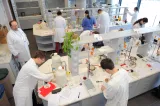Prof. Bílková’s team participated in the LOVE FOOD International Project
Thanks to its academic members of staff, the University of Pardubice has also met with success on the international fields of science. This time the University was backed up by Prof. Zuzana Bílková’s team from the Department of Biological and Biochemical Sciences, Faculty of Chemical Technology. Being the only team from the Czech Republic, it collaborated with other partners in bringing the Love Food Project to life. And not only the Czechs, but all Europeans can be proud of the team.
The Council of European Research and Innovation evaluated the Love Food Project as being one of the best projects funded through the Seventh Framework Programme with a substantial impact for the development of the field and the economy in EU member states. The project enabled interdisciplinary specialists to cooperate synergistically with the aim of producing incentives that can be realised in practice for the benefit of current knowledge and the actual issue at hand.
The Love Food Project combines innovative results in the field of bio-nanotechnology with modern DNA detection techniques. It focuses on the development of a micro-analyser that will help to detect foodborn pathogenic bacteria very quickly, such as Salmonella or Bacillus.
Prof. Bílková’s team worked with magnetic particles and milk
A raw material designed for the production of dairy products, i.e. milk, became centre to research interests. Prof. Zuzana Bílková and her team from the Department of Biological and Biochemical Sciences stand behind the development of a carrier based on magnetic micro-particles for the specific isolation of pathogenic microorganisms found in milk. The research team was made up of the following people – Mgr. Jana Srbová, Mgr. Pavla Krulišová, Mgr. Iveta Brožková, Mgr. Petra Moťková. Their joint objective was to cover magnetic micro-particles with specific pathogenic bacteria antibodies and then integrate them into a micro-flow analyser.
Love Food Project partners also constituted further experts specialising in physical chemistry, electrochemistry, molecular biology and microbiology. The magnetic micro-particles that were developed and surface finished in Pardubice were integrated into a special micro-fluid device developed by the Curie Institute (Paris), another project partner. First of all, artificially prepared mixtures of pathogenic and non-pathogenic microorganisms were tested and then real milk samples differing in fat content were also tested. The efficiency and the selectivity of pathogen capture were monitored in real samples. Partial tests were carried out at the Department of Biological and Biochemical Sciences and then validated together with microbiologists from the Institute Pasteur in Paris. Mgr. Srbová and Mgr. Krulišová, both internal Ph.D students, participated in short-term study programmes at both of the above mentioned institutes.
The method is fast; it replaces multiple-day culture testing
Carriers on the basis of magnetic particles allow for the isolation of pathogenic bacterial cells from a large volume of examined material (dozens of mililitres) and, at the same time, for their concentration into a minimum sample volume (dozens of microlitres). Captured bacterial cells are then subjected to lysis and the released bacterial DNA is multiplied and transferred to an electroacoustic sensor that draws attention to its presence by changing the SAW signal.
The immunomagnetic pathogen isolation principle together with other steps realised within the micro-analyser, i.e. cell lysis, multiplication of bacterial DNA and its electroacoustic detection should allow milk producers to quickly – in a number of hours – and specifically establish the presence of pathogens in milk. Traditional pathogenic bacteria cultivation proof lasting 2-3 days can be replaced in this way. This system very much reduces the time necessary for the quality control of raw materials used for the production of dairy products; this will result in increased production and consumption safety.
It will also be of much help in other areas
The novelty of this method lies in the ability to analyse pathogens normally found in milk easily, quickly, accurately and without the need for fully equipped laboratory facilities. All milk producers need is a 25 ml sample that will subjected to immunomagnetic isolation of pathogens. The isolated bacteria (100–150 µl) are then placed into a credit card-size micro-analyser where the sample is then modified and subjected to direct detection and the user gets the result in a very short time.
Moreover, milk producers and the producers of dairy products can themselves use this method. In this way they can easily control the safety of the initial raw materials and the safety of the products at the point of production. The method is a major innovation in the field of microbiological analysis. It could also be used to detect pathogens in other foodstuffs that may be contaminated and, thus, have a negative impact on human health. The new method can potentially be applied to other relevant areas such as clinical diagnostics and environmental analysis.
Please refer to the website for more information about the Love Food Project. It was a success also thanks to the team of scientists from the University of Pardubice.


